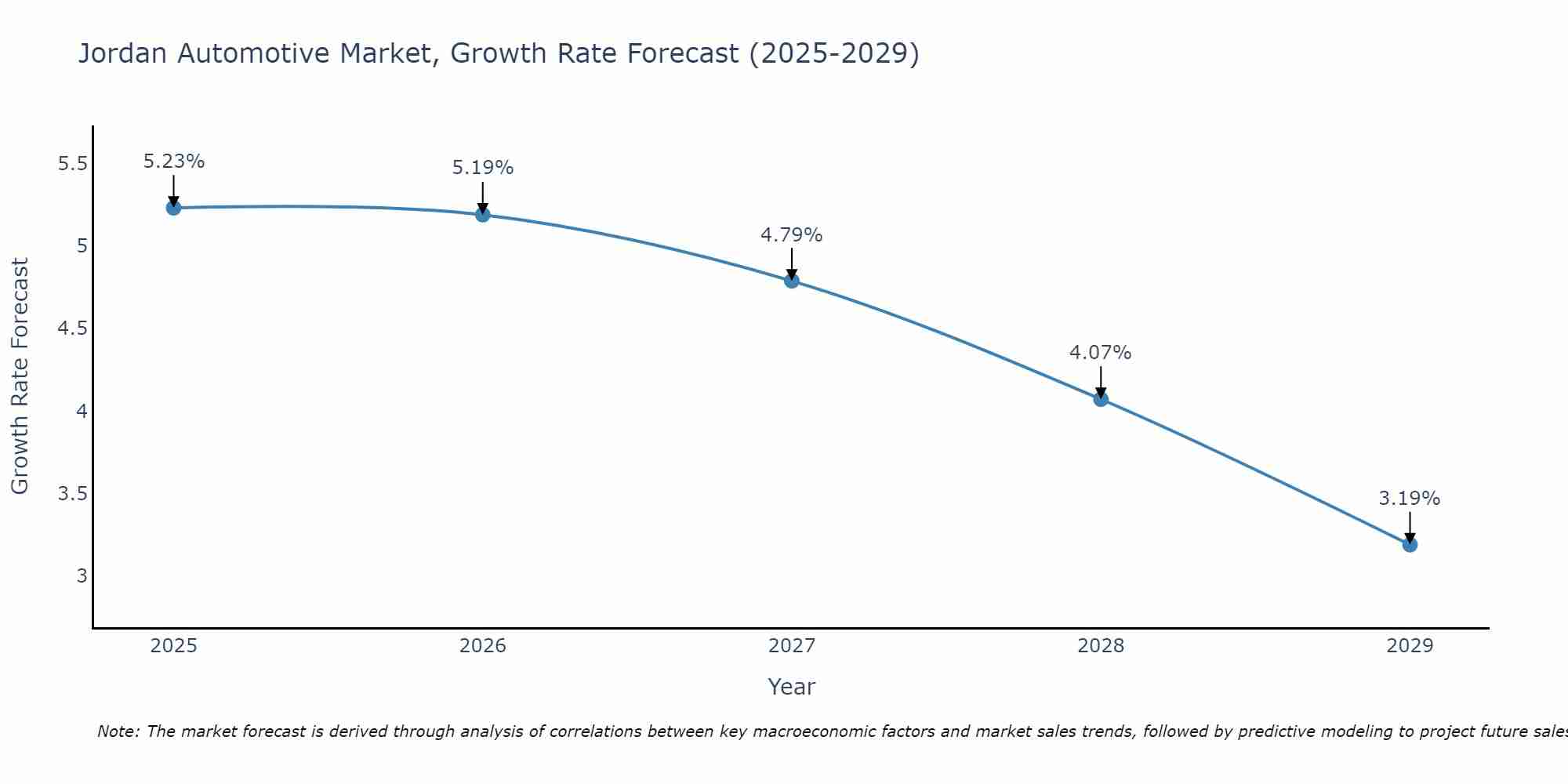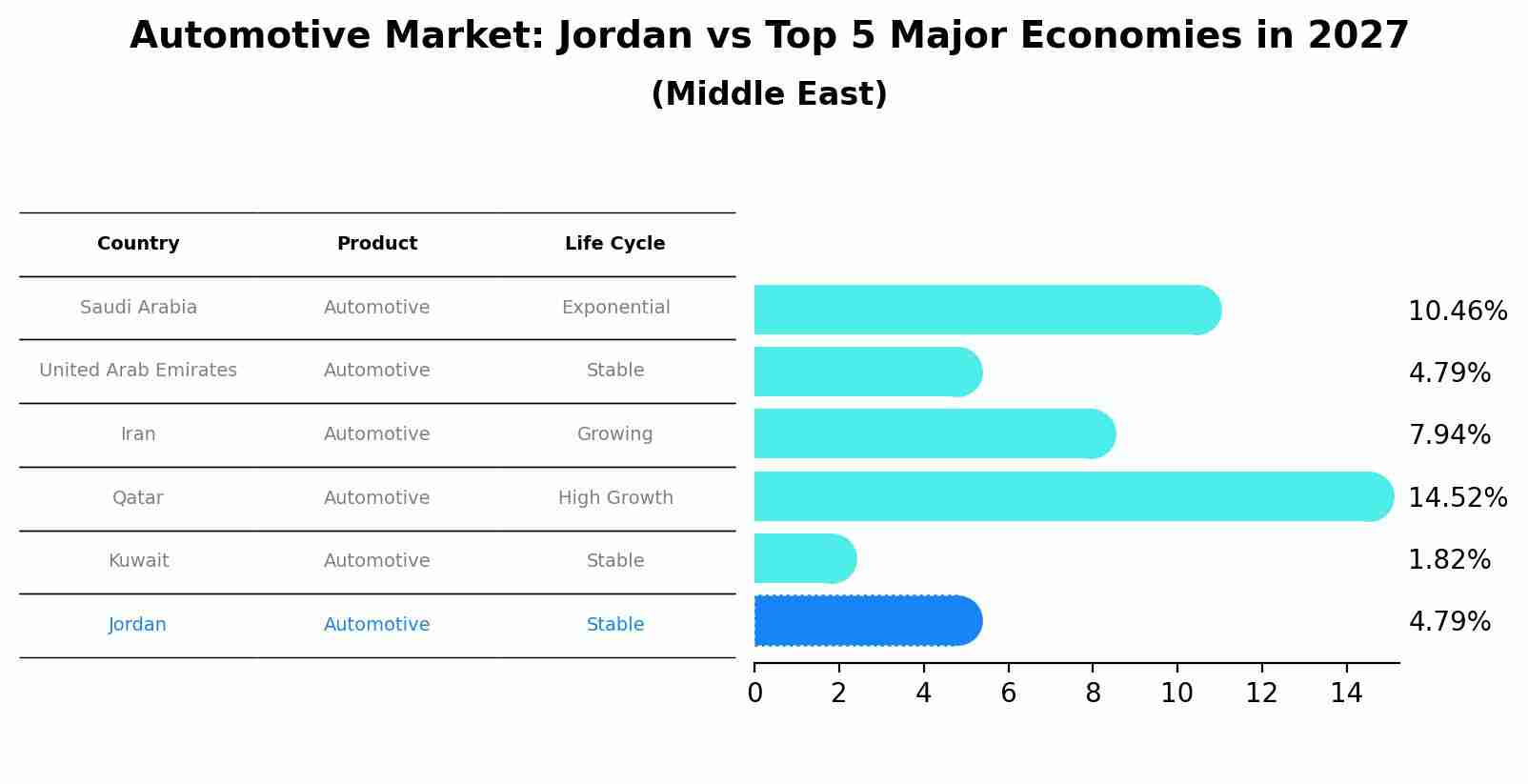Jordan Automotive Market Outlook | Companies, Share, Size, Value, Analysis, Growth, Industry, Revenue, Forecast, Trends & COVID-19 IMPACT
| Product Code: ETC431802 | Publication Date: Oct 2022 | Updated Date: Jul 2025 | Product Type: Market Research Report | |
| Publisher: 6Wresearch | Author: Shubham Padhi | No. of Pages: 75 | No. of Figures: 35 | No. of Tables: 20 |
Jordan Automotive Market Size Growth Rate
The Jordan Automotive Market may undergo a gradual slowdown in growth rates between 2025 and 2029. Beginning strongly at 5.23% in 2025, growth softens to 3.19% in 2029.

Automotive Market: Jordan vs Top 5 Major Economies in 2027 (Middle East)
Jordan's Automotive market is anticipated to experience a stable growth rate of 4.79% by 2027, reflecting trends observed in the largest economy Saudi Arabia, followed by United Arab Emirates, Iran, Qatar and Kuwait.

Jordan Automotive Market Synopsis
The Jordan automotive market is experiencing steady growth, driven by factors such as increasing disposable income, urbanization, and a growing population. The market is dominated by imported vehicles, particularly from Japan, South Korea, and Europe. Consumers in Jordan generally prefer compact and mid-size sedans, SUVs, and pickup trucks. There is also a growing interest in electric and hybrid vehicles, as the government is promoting environmentally friendly transportation solutions. The competitive landscape includes both international automakers and local dealerships, offering a wide range of brands and models to cater to varying consumer preferences. In terms of challenges, the market faces issues related to high import taxes, fluctuating fuel prices, and traffic congestion in urban areas. Overall, the Jordan automotive market presents opportunities for both established players and new entrants looking to capitalize on the country`s growing demand for automobiles.
Jordan Automotive Market Trends
The Jordan Automotive Market is currently experiencing a shift towards electric and hybrid vehicles, driven by increasing awareness of environmental issues and government incentives to promote sustainable transportation options. Consumers are showing interest in vehicles with advanced safety features, connectivity options, and autonomous driving capabilities. There is also a growing demand for SUVs and crossovers, reflecting changing preferences towards larger and more versatile vehicles. The market is witnessing an increase in the adoption of online platforms for researching and purchasing vehicles, as well as a focus on providing personalized customer experiences. Overall, the Jordan Automotive Market is adapting to global trends towards cleaner technology, safety innovations, and digital integration to meet the evolving needs and preferences of consumers.
Jordan Automotive Market Challenges
The Jordan automotive market faces several challenges, including high import tariffs and taxes on vehicles, which drives up the overall cost for both consumers and manufacturers. Additionally, the market is relatively small compared to other countries in the region, limiting economies of scale and potentially hindering investment and growth opportunities. Infrastructure issues, such as traffic congestion and limited public transportation options, also impact the automotive market by affecting consumer preferences and purchasing decisions. Moreover, fluctuating fuel prices and environmental concerns add further complexity to the market dynamics, requiring companies to adapt their product offerings to meet changing consumer demands and regulatory requirements. Overall, these challenges create a competitive and challenging environment for automotive companies operating in Jordan.
Jordan Automotive Market Investment Opportunities
The Jordanian automotive market presents several investment opportunities, driven by factors such as a growing economy, increasing consumer purchasing power, and a rising demand for vehicles. One potential area for investment is in electric vehicles (EVs), as the government is actively promoting the adoption of environmentally friendly transportation solutions. Another opportunity lies in the aftermarket sector, including spare parts and maintenance services, as the existing vehicle fleet in Jordan will require ongoing maintenance and repairs. Additionally, investments in innovative mobility solutions, such as car-sharing services or ride-hailing platforms, could capitalize on changing consumer preferences and urban mobility trends. Overall, the Jordan Automotive Market offers diverse investment prospects for those looking to capitalize on the evolving automotive landscape in the country.
Jordan Agar Market Government Policies
The Jordanian government has implemented various policies to support the automotive market in the country. These include offering tax incentives and exemptions to encourage local production and investment in the automotive industry. Additionally, the government has imposed regulations to control vehicle emissions and promote the use of environmentally friendly vehicles. Import tariffs and licensing requirements are also in place to regulate the importation and sale of vehicles in Jordan, aiming to protect local manufacturers and promote the growth of the domestic automotive sector. Overall, these government policies aim to stimulate growth, innovation, and sustainability in the Jordan automotive market while ensuring compliance with international standards and regulations.
Jordan Automotive Market Future Outlook
The future outlook for the Jordan Automotive Market appears positive, driven by an increasing consumer demand for vehicles as the economy continues to grow. With the government`s focus on infrastructure development and urbanization projects, there will likely be an uptick in the demand for commercial vehicles. Additionally, the rising awareness of environmental issues may lead to a surge in the adoption of electric and hybrid vehicles in the market. As global automotive trends evolve towards autonomous and connected vehicles, Jordan is expected to gradually integrate these technologies into its market offerings. Overall, the Jordan Automotive Market is poised for steady growth and innovation in the coming years, presenting opportunities for both local and international automotive manufacturers and suppliers to thrive in the region.
Key Highlights of the Report:
- Jordan Automotive Market Outlook
- Market Size of Jordan Automotive Market, 2021
- Forecast of Jordan Automotive Market, 2031
- Historical Data and Forecast of Jordan Automotive Revenues & Volume for the Period 2018 - 2031
- Jordan Automotive Market Trend Evolution
- Jordan Automotive Market Drivers and Challenges
- Jordan Automotive Price Trends
- Jordan Automotive Porter's Five Forces
- Jordan Automotive Industry Life Cycle
- Historical Data and Forecast of Jordan Automotive Market Revenues & Volume By Product Type for the Period 2018 - 2031
- Historical Data and Forecast of Jordan Automotive Market Revenues & Volume By Electric for the Period 2018 - 2031
- Historical Data and Forecast of Jordan Automotive Market Revenues & Volume By Hybrid Electric for the Period 2018 - 2031
- Historical Data and Forecast of Jordan Automotive Market Revenues & Volume By Plug-In Hybrid Electric for the Period 2018 - 2031
- Historical Data and Forecast of Jordan Automotive Market Revenues & Volume By Mild Hybrid for the Period 2018 - 2031
- Historical Data and Forecast of Jordan Automotive Market Revenues & Volume By Natural Gas for the Period 2018 - 2031
- Historical Data and Forecast of Jordan Automotive Market Revenues & Volume By Fuel Cell Electric for the Period 2018 - 2031
- Historical Data and Forecast of Jordan Automotive Market Revenues & Volume By Diesel for the Period 2018 - 2031
- Historical Data and Forecast of Jordan Electric Automotive Market Revenues & Volume By Petrol for the Period 2018 - 2031
- Jordan Automotive Import Export Trade Statistics
- Market Opportunity Assessment By Product Type
- Jordan Automotive Top Companies Market Share
- Jordan Automotive Competitive Benchmarking By Technical and Operational Parameters
- Jordan Automotive Company Profiles
- Jordan Automotive Key Strategic Recommendations
Frequently Asked Questions About the Market Study (FAQs):
- Single User License$ 1,995
- Department License$ 2,400
- Site License$ 3,120
- Global License$ 3,795
Search
Related Reports
- Saudi Arabia Manlift Market (2025-2031) | Outlook, Size, Growth, Trends, Companies, Industry, Revenue, Value, Share, Forecast & Analysis
- Uganda Excavator, Crane, and Wheel Loaders Market (2025-2031) | Strategy, Consumer Insights, Analysis, Investment Trends, Opportunities, Growth, Size, Share, Industry, Revenue, Segments, Value, Segmentation, Supply, Forecast, Restraints, Outlook, Competition, Drivers, Trends, Demand, Pricing Analysis, Competitive, Strategic Insights, Companies, Challenges
- Rwanda Excavator, Crane, and Wheel Loaders Market (2025-2031) | Strategy, Consumer Insights, Analysis, Investment Trends, Opportunities, Growth, Size, Share, Industry, Revenue, Segments, Value, Segmentation, Supply, Forecast, Restraints, Outlook, Competition, Drivers, Trends, Demand, Pricing Analysis, Competitive, Strategic Insights, Companies, Challenges
- Kenya Excavator, Crane, and Wheel Loaders Market (2025-2031) | Strategy, Consumer Insights, Analysis, Investment Trends, Opportunities, Growth, Size, Share, Industry, Revenue, Segments, Value, Segmentation, Supply, Forecast, Restraints, Outlook, Competition, Drivers, Trends, Demand, Pricing Analysis, Competitive, Strategic Insights, Companies, Challenges
- Angola Excavator, Crane, and Wheel Loaders Market (2025-2031) | Strategy, Consumer Insights, Analysis, Investment Trends, Opportunities, Growth, Size, Share, Industry, Revenue, Segments, Value, Segmentation, Supply, Forecast, Restraints, Outlook, Competition, Drivers, Trends, Demand, Pricing Analysis, Competitive, Strategic Insights, Companies, Challenges
- Israel Intelligent Transport System Market (2025-2031) | Strategy, Consumer Insights, Analysis, Investment Trends, Opportunities, Growth, Size, Share, Industry, Revenue, Segments, Value, Segmentation, Supply, Forecast, Restraints, Outlook, Competition, Drivers, Trends, Demand, Pricing Analysis, Competitive, Strategic Insights, Companies, Challenges
- Uganda Precast and Aggregate Market (2025-2031) | Strategy, Consumer Insights, Analysis, Investment Trends, Opportunities, Growth, Size, Share, Industry, Revenue, Segments, Value, Segmentation, Supply, Forecast, Restraints, Outlook, Competition, Drivers, Trends, Demand, Pricing Analysis, Competitive, Strategic Insights, Companies, Challenges
- Australia IT Asset Disposal Market (2025-2031) | Strategy, Consumer Insights, Analysis, Investment Trends, Opportunities, Growth, Size, Share, Industry, Revenue, Segments, Value, Segmentation, Supply, Forecast, Restraints, Outlook, Competition, Drivers, Trends, Demand, Pricing Analysis, Competitive, Strategic Insights, Companies, Challenges
- UAE Building Thermal Insulation Market Outlook (2025-2031) | Revenue, Companies, Share, Trends, Growth, Size, Forecast, Industry, Analysis & Value
- Portugal Electronic Document Management Market (2025-2031) | Strategy, Consumer Insights, Analysis, Investment Trends, Opportunities, Growth, Size, Share, Industry, Revenue, Segments, Value, Segmentation, Supply, Forecast, Restraints, Outlook, Competition, Drivers, Trends, Demand, Pricing Analysis, Competitive, Strategic Insights, Companies, Challenges
Industry Events and Analyst Meet
Our Clients
Whitepaper
- Middle East & Africa Commercial Security Market Click here to view more.
- Middle East & Africa Fire Safety Systems & Equipment Market Click here to view more.
- GCC Drone Market Click here to view more.
- Middle East Lighting Fixture Market Click here to view more.
- GCC Physical & Perimeter Security Market Click here to view more.
6WResearch In News
- Doha a strategic location for EV manufacturing hub: IPA Qatar
- Demand for luxury TVs surging in the GCC, says Samsung
- Empowering Growth: The Thriving Journey of Bangladesh’s Cable Industry
- Demand for luxury TVs surging in the GCC, says Samsung
- Video call with a traditional healer? Once unthinkable, it’s now common in South Africa
- Intelligent Buildings To Smooth GCC’s Path To Net Zero













